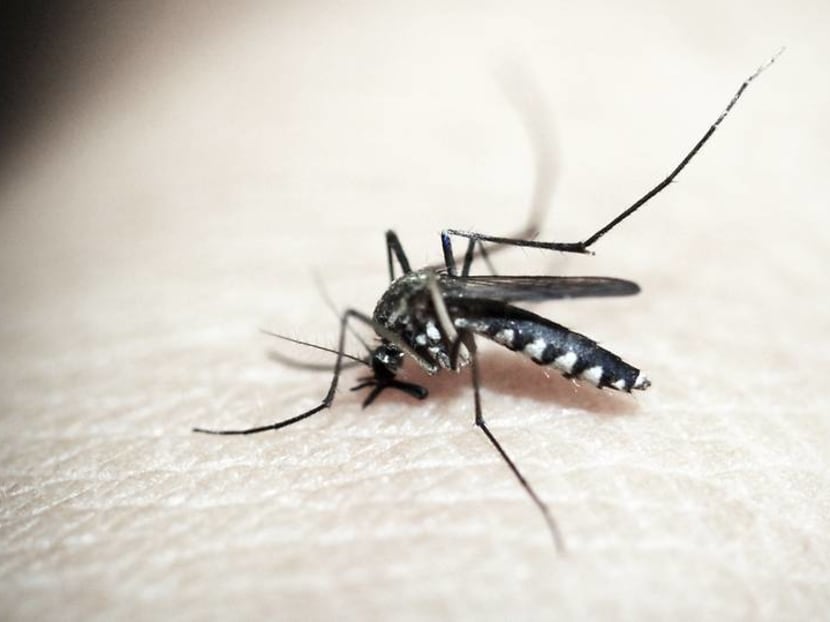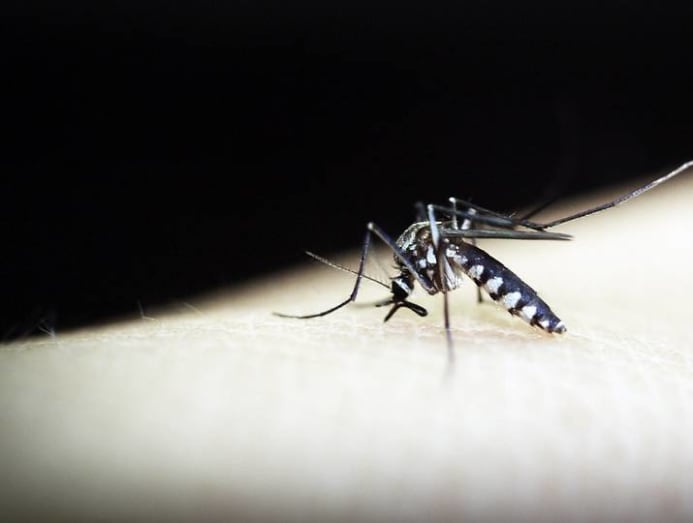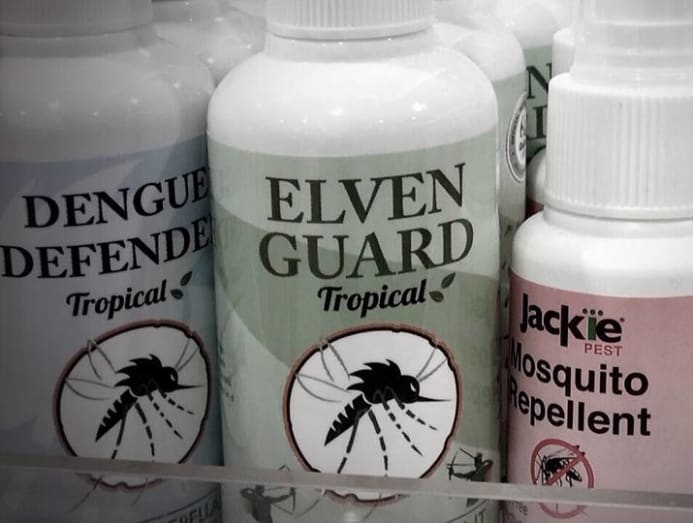Dengue cases on the rise: What you need to know to avoid mosquito bites
Ad
CNA Lifestyle
Dengue cases on the rise: What you need to know to avoid mosquito bites
With dengue cases hitting its highest level in more than 3 years, what can you count on to keep the mozzies away: Insect repellent sprays, patches, wristbands, essential oils, bug zappers or apps?

(Photo: Pexels)
05 Dec 2022 06:18AM (Updated: 11 Jul 2022 01:53AM)
Yous don't have to venture into the depths of Bukit Timah Nature Reserve or have a picnic in the Botanic Gardens to get attacked. You could be in the sanctuary of your ain home, windows closed and air-conditioner switched on. Most times, the assault is covert; you might only know when an itchy spot gets your attending.
Merely by then, the damage is already done. You lot take been bitten by a mosquito.
In Singapore, business organisation over musquito bites get beyond the superficial itch – and for good reason, too. Dengue, Zika, and chikungunya are diseases that tin be transmitted by mosquitoes and are well documented here.
As a tropical country, Singapore is prime number convenance ground for mosquitoes, which proliferate in warm temperatures. The warmer months are generally when their population is expected to boom.
2019 has seen a spike in the number of dengue cases, with weekly cases striking 666 in the week catastrophe Jul 13, the highest recorded in a week since Jan 2016, according to National Environment Bureau (NEA) information.
As of 3pm on Monday (Jul fifteen), at that place were seven,483 recorded cases of dengue in Singapore in 2019, almost five times the number of cases in the same period last year, NEA said.

MOZZIE WATCH
To date, over 170 species of mosquitoes take been identified in Singapore by the NEA's Ecology Health Institute. Of the lot, the iii most mutual groups of musquito hither are Aedes, Culex and Anopheles.
Fortunately, virtually of the species are found in rural, forested areas. But the infamous Aedes aegypti – the main species that transmits dengue in Singapore – has adapted to urban environments and developed a taste for human blood, according to the NEA.
To date, over 170 species of mosquitoes have been identified in Singapore.
Aedes albopictus, which breeds in areas with a lot of greenery, can as well transmit dengue merely it doesn't practice so equally efficiently as Aedes aegypti. The chikungunya and Zika viruses are also transmitted by both species.
Aedes aegypti and Aedes albopictus bite primarily during the day, said the NEA, only they tin also set on at night in well-lit places. Later on sundown, the Culex and Anopheles take over the bloodsucking. Simply female mosquitoes bite and spread diseases; male mosquitoes are quite happy feeding on nectar.
WHAT Attract MOSQUITOES
- Your jiff

Your skin's unique concoction of bacteria and sweat is a magnet that draws in the winged claret suckers, said Dr Cameron Webb, clinical lecturer at The University of Sydney's Westmead Clinical School, and Institute Of Clinical Pathology And Medical Enquiry.
In a The Chat article, he wrote that this smelly mix comprising up to 400 chemical compounds on the human skin "is probable to explicate why there is substantial variation in how many mozzies nosotros attract".
"One of the best studied substances independent in sweat is lactic acid," said Dr Webb. "Research shows information technology's a key mosquito attractant, peculiarly for human-bitter species such equally Aedes aegypti."
- The chemicals y'all emit
The ones that are linked to oestrogen can brand you lot irresistible to mosquitoes, said Dr Jonathan Day, a professor of medical entomology at the University of Florida, in the same ABC News article.
Once they strop in, mozzies use your body heat "to very apace make up one's mind where blood is closest to the surface," he said.
They do this before inserting a needle-like proboscis into your pare to excerpt the blood, typically from your forehead, wrists, elbows and neck. If you've but finished a conditioning or are feeling warm, yous may be more decumbent to bites as your blood is closer to the surface of the skin throughout your trunk, he said.
- Your clothes, perfume and perhaps your feet

You may prefer to article of clothing dark colours just if you lot're going somewhere bright or has light colours, the contrast is akin to painting a big target sign on yourself. According to Rentokil'south medical entomologist, Dr Chan Hiang Hao, mosquitoes are attracted to color contrasts. "Certain floral perfumes are also known to attract mosquitoes," he said, adding that things like Limburger cheese and dirty socks, particularly nylon ones, are also mosquito magnets.
All the same, Dr Webb noted that the musquito-and-cheese link doesn't apply to every mosquito species. "The bacteria that gives (Limburger) cheese its distinctive smell is closely related to germs living between our toes," he said. That explains why Anopheles gambiae that spreads malaria are attracted to evil-smelling anxiety.
Your skin'southward unique batter of leaner and sweat is a magnet that draws in the winged bloodsuckers.
Merely supervene upon the malaria-bearing mosquito with another species such equally Aedes aegypti and the phenomenon is not repeated, said Dr Webb. "Even pathogens such equally malaria may make us more attractive to mosquitoes once we're infected."
DO THESE MOZZIE-REPELLING METHODS Piece of work?
The nigh bones method of mosquito-proofing yourself is to apply an insect repellent and wear long-sleeved clothes when you're out and about.
To rid your domicile of the irritant, the best thing yous can do is to remove stagnant water effectually the firm to cease them from breeding. You could also consider installing mosquito screens on the windows or spraying dark corners with an aerosol insecticide, advised the NEA.

But beyond those methods, there are also many other items on the market that promise to shield yous from mosquitoes – from insect repellent sprays to patches, wristbands, essential oils, issues zappers and even apps. How do they stack upwardly? Here's a expect.
- Musquito repellent apps
They work on the principle that certain sound frequencies can end mosquitoes from biting, and so the apps supposedly emit a range of frequencies to achieve that. Just how effective are these digital deterrents? "These apps are well-nigh likely a hoax. In that location is no strong scientific reason and study to show that this works," said Dr Chan.
Wristbands and patches are not effective due to the limited coverage. They only protect areas where they are stuck on or worn.
- Wristbands and patches
These are usually infused with citronella or lemongrass essential oils, which take a very apparent smell in one case y'all remove them from their packaging. But they may simply wind up making you smell good, that's all.
"Unfortunately, essential oils, including the commonly believed lemongrass, do non piece of work," said Dr Chan. "Wristbands and patches are not effective due to the limited coverage. They only protect areas where they are stuck on or worn," he added.
- Topical insect repellents
Repellents containing DEET (N,N-diethyl-yard-toluamide), picaridin or IR3535 equally the agile ingredient are the most effective in repelling mosquitoes. "These products are safety even for utilise past pregnant women and nursing mothers. Products with less than x per cent DEET are safe for young children and infants from two months of age," said a spokesperson from NEA.

But if you lot're chemophobic, you could give natural repellents a shot. However, don't expect them to work also as the chemical ones. "Although these can mostly provide some protection against bitter insects, they are less constructive than those containing DEET, picaridin and IR3535," said the NEA spokesperson.
"The effectiveness of repellents based on plant-based extracts, such as citronella, eucalyptus and other essential oils, varies from person to person, and such products unremarkably require more frequent application."
- Aerosol insecticides

These sprays can kill mozzies – provided you lot use the right ane. Earlier you depress the can's push button and release the spray, check the content, said entomologist Jo-Lynn Teh on the Thermacell Singapore website.
"Aerosol insecticides are designed differently for crawling insects (oil-like conception) and flying insects (water-like formulation). Using the incorrect one without reading label not only makes your room oily, you may also expose yourself to unnecessary hazard," she said.
- Issues zappers
These light devices typically have a lamp that emits ultraviolet or UV light to lure the mosquitoes in. The space in the metallic mesh is just right for a mosquito to consummate the electric circuit when it tries to fly through, and information technology gets killed past the current.
But don't count on the devices working 100 per cent. While they may zap more 10,000 bugs in 1 evening, they may non all be mosquitoes. "The UV calorie-free devices practise take hold of mosquitoes to a sure extent. Even so, mosquitoes are more than attracted to a combination of human being odour and body temperature," said Dr Chan.
- Mosquito coils
If, for some reason, yous're still using musquito coils, consider giving them up, said Dr Chan. "They produce fume and an unpleasant odour, and are a potential burn chance. They also dirty the surface area with ashes."
His recommendation is to use the electric liquid vaporiser instead. "It is more user-friendly with no smoke or smell. It volition not cause a burn down and is rather long lasting (about 1 to two months)."
Recent Searches
Trending Topics
Source: https://cnalifestyle.channelnewsasia.com/wellness/how-to-avoid-mosquito-bites-singapore-dengue-259796

0 Response to "Dengue cases on the rise: What you need to know to avoid mosquito bites"
Post a Comment